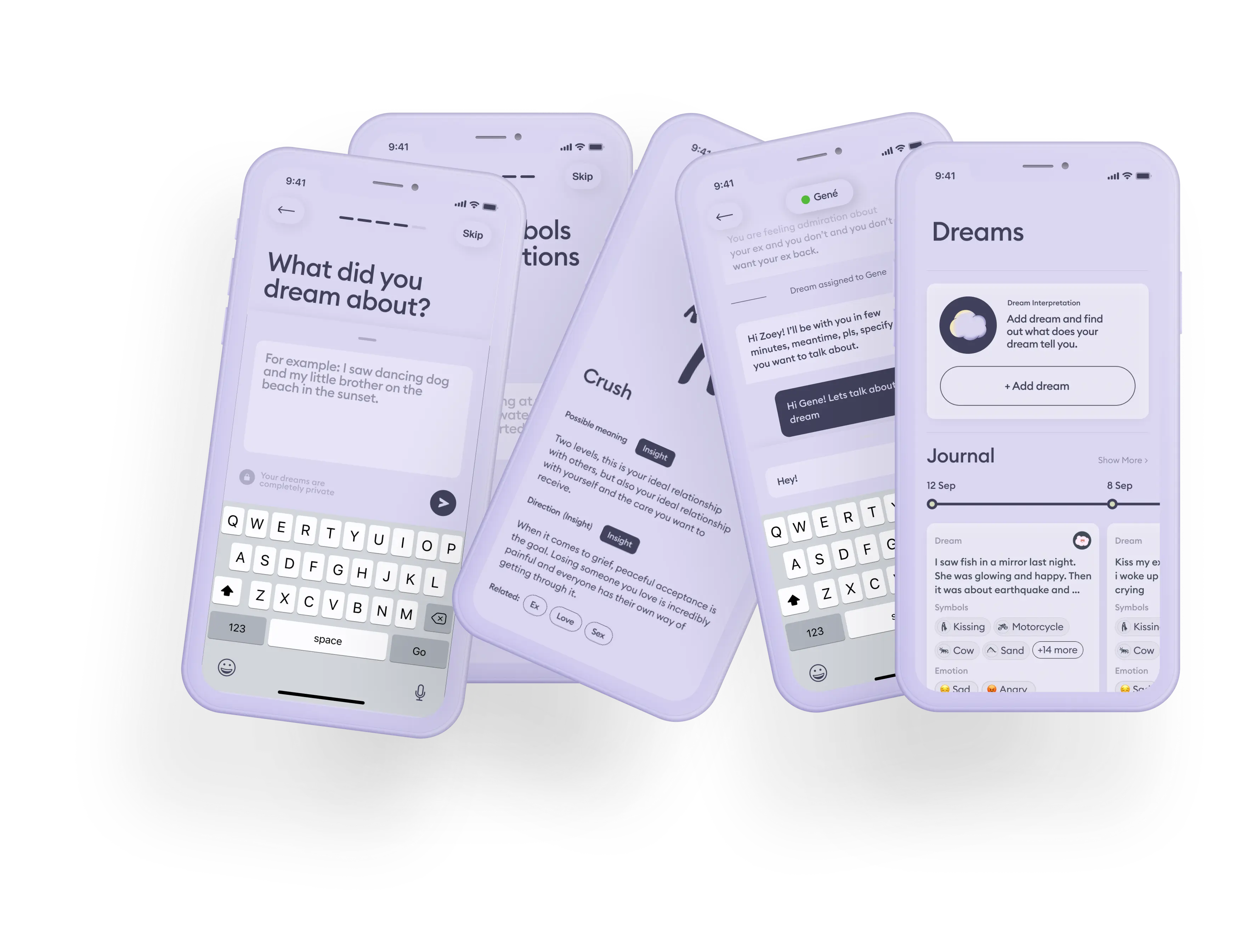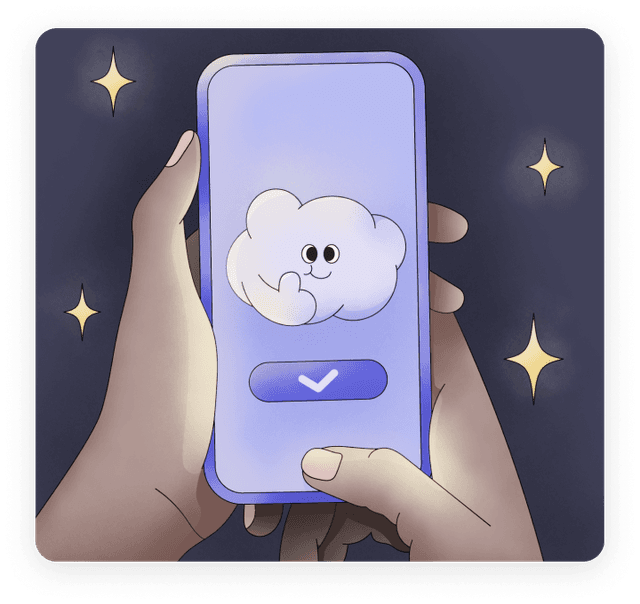
Denys Chumak
25 Nov 2024
The Connection Between Sleep and Mental Health
Ever wondered why sleep is so essential to your overall well-being? Sleep is far more than just a way to rest your body. It plays an important role in maintaining your mental health and emotional stability.
In fact, numerous studies show that sleep disturbances are closely linked to mental health disorders like anxiety, depression, and even more severe conditions such as psychosis and bipolar disorder.
Sleep affects everything from your mood and energy levels to how well you handle stress.
In this blog, we’ll explore the connection between sleep and mental health, look into how sleep disturbances can worsen mental well-being, and discuss strategies for improving sleep quality. We’ll also touch on dream theory, the role of REM sleep, and the famous researchers and activists who have shaped our understanding of the link between sleep and mental health.
How Does Sleep Relate to Mental Health?
The relationship between sleep and mental health is complex and intertwined. Poor sleep can lead to mental health disorders, and, in turn, mental health problems can make it difficult to get good quality sleep. This two-way relationship means that improving your sleep can have a positive impact on your mental health, and managing your mental health can lead to better sleep.
The Impact of Sleep on Mental Health
Poor sleep affects your ability to regulate emotions, think clearly, and process stress. Studies show that people who don’t get enough sleep are more prone to emotional instability, irritability, and difficulty managing stress. Moreover, chronic sleep deprivation can lead to long-term mental health issues, including:
-
Increased anxiety: Lack of sleep can heighten feelings of anxiety and make it harder to cope with stress.
-
Depression: Sleep disturbances are strongly linked to depression. People who suffer from insomnia are significantly more likely to develop depression compared to those who sleep well.
-
Psychosis and bipolar disorder: In extreme cases, prolonged sleep deprivation can trigger hallucinations, paranoia, and even episodes of mania in those with bipolar disorder.
-
Cognitive decline: Sleep is essential for memory consolidation and cognitive function. Without adequate sleep, your ability to concentrate, make decisions, and remember things diminishes.
The Sleep-Mental Health Cycle
The relationship between sleep and mental health often becomes a vicious cycle:
-
Poor sleep leads to increased stress, anxiety, and depression.
-
Mental health disorders make it harder to fall and stay asleep.
-
Insomnia exacerbates symptoms of mental illness, making it harder to cope with daily challenges, which leads to even worse sleep.
This cycle can be hard to break, but addressing sleep problems early on is key to preventing further mental health issues.
Famous Scientists and Activists Who Studied Sleep and Mental Health
Several researchers and activists have significantly contributed to our understanding of how sleep and mental health are connected:
1. Sigmund Freud:
The father of psychoanalysis, Freud proposed that dreams are a window into the unconscious mind. His work on dream interpretation laid the foundation for modern sleep studies, suggesting that dreams help process hidden desires and emotions.
2. Matthew Walker:
One of the most prominent sleep scientists today, Walker’s research has revealed how sleep impacts nearly every aspect of our health, including mental well-being. His studies emphasize the importance of REM sleep for emotional regulation and memory consolidation.
3. Arianna Huffington:
As a media mogul and founder of Thrive Global, Huffington has been a vocal advocate for sleep health. Her own experience with burnout due to lack of sleep led her to emphasize the critical role of sleep in mental and physical well-being.
Sleep Disorders and Their Impact on Mental Health
Many people experience sleep disorders that significantly affect their mental health. Understanding these conditions can help identify and address the root cause of sleep problems.
1. Insomnia
What it is: Insomnia is characterized by difficulty falling asleep, staying asleep, or waking up too early.
Mental health impact: Insomnia is closely linked to mental health issues such as anxiety and depression. Those with chronic insomnia are far more likely to develop these conditions.
Example: A person experiencing work-related stress may develop insomnia, which in turn heightens their stress and anxiety levels, making it even harder to sleep.
2. Sleep Apnea
What it is: Sleep apnea causes interrupted breathing during sleep, leading to poor sleep quality and frequent awakenings.
Mental health impact: People with sleep apnea are at a higher risk for depression and anxiety. Chronic fatigue from interrupted sleep can worsen mood disorders.
Example: Someone with untreated sleep apnea might feel constantly tired and irritable, affecting their mental state and making it difficult to function during the day.
3. Nightmares and PTSD
What it is: People who have experienced trauma, especially those with Post-Traumatic Stress Disorder (PTSD), often suffer from nightmares that disrupt sleep.
Mental health impact: Frequent nightmares can increase anxiety and depression and in severe cases, lead to paranoia and flashbacks during the day.
Example: Veterans suffering from PTSD often report recurring nightmares that prevent them from getting restful sleep, which intensifies their anxiety and feelings of fear.
4. Restless Leg Syndrome (RLS)
What it is: RLS is a condition where individuals feel an uncontrollable urge to move their legs, especially at night, disrupting sleep.
Mental health impact: Sleep deprivation caused by RLS can lead to fatigue, anxiety, and depression.
Example: A person with RLS may feel constantly tired during the day, making it harder to concentrate and manage daily tasks, leading to increased frustration and irritability.
The Role of Dreams in Mental Health
Dreams have long been a subject of fascination, but they also play a critical role in mental health. According to Freud's dream theory, dreams reveal the hidden desires of the unconscious mind, helping us process unresolved emotions.
Why Are Dreams Important?
Dreams occur primarily during REM sleep, a critical stage for emotional processing. During REM sleep, your brain sorts through emotions and memories from the day. Studies show that people who don’t get enough REM sleep are more prone to emotional instability, anxiety, and depression.
How Do Dreams Affect Mental Health?
Emotional regulation: Dreams help regulate emotions by processing stressful or traumatic experiences.
Memory consolidation: During REM sleep, the brain strengthens important memories and discards irrelevant information.
Problem-solving: Some studies suggest that dreams play a role in creative problem-solving by allowing the brain to explore different solutions in a safe, hypothetical environment.
If you’re frequently waking up from intense dreams or nightmares, it could be a sign that your mental health needs attention. Improving sleep quality through healthy habits or therapy can reduce the frequency of distressing dreams.
Strategies for Improving Sleep Quality
Improving your sleep can lead to significant benefits for your mental health. Here are some effective strategies to improve sleep quality:
1. Establish Good Sleep Hygiene
Good sleep hygiene involves creating an environment and routine that promotes restful sleep:
-
Stick to a consistent bedtime and wake-up time, even on weekends.
-
Avoid caffeine, nicotine, and heavy meals close to bedtime.
-
Dim the lights and engage in relaxing activities like reading or meditating before bed.
-
Make your bedroom a sleep sanctuary by ensuring it's dark, quiet, and cool.
2. Cognitive Behavioral Therapy for Insomnia (CBT-I)
CBT-I is a proven treatment for people suffering from insomnia. It focuses on changing the negative thoughts and behaviors that contribute to sleep problems. Studies show that CBT-I can be as effective as medication in treating chronic insomnia and can have lasting effects on improving mental health.
3. Exercise Regularly
Physical activity helps regulate your sleep-wake cycle. Regular exercise, especially aerobic activities like walking or swimming, can improve the quality and duration of your sleep. However, avoid exercising too close to bedtime as it may make it harder to fall asleep.
4. Limit Stimulants and Alcohol
While alcohol may make you feel drowsy, it actually disrupts your sleep cycle and prevents you from reaching the deeper stages of sleep. Similarly, caffeine and nicotine are stimulants that can make it difficult to fall asleep.
5. Mindfulness and Relaxation Techniques
Meditation, deep breathing exercises, and progressive muscle relaxation can help calm your mind and reduce anxiety before bedtime. These techniques lower stress hormones like cortisol, helping you fall asleep faster and achieve deeper sleep.
6. Improve Your Sleep Environment
Your bedroom should be a calm, sleep-friendly space. Invest in a comfortable mattress and pillows. Blackout curtains or a sleep mask can block out disruptive light, and earplugs or a white noise machine can drown out noise.
7. Manage Stress and Anxiety
Chronic stress and anxiety are major causes of sleep disturbances. Managing your stress during the day through mindfulness, therapy, or journaling can reduce the chances of it affecting your sleep.
Conclusion
Sleep and mental health are closely connected. Poor sleep can exacerbate mental health issues, and mental health disorders can make it harder to get good quality sleep. Addressing sleep disturbances early on through strategies like good sleep hygiene, CBT-I, and relaxation techniques can significantly improve both your sleep and mental well-being.
Understanding your dreams and the role of REM sleep in emotional regulation can also provide valuable insights into your mental health. If you’re struggling with sleep and it’s affecting your mental state, it’s important to take action. Whether through improving sleep habits or seeking professional help, better sleep can lead to a healthier, happier mind.
Want to go deeper into understanding your dreams and how they affect your mental health? Try DreamApp to gain insights into your subconscious and improve your emotional well-being.
FAQs About Sleep and Mental Health
1. How does lack of sleep affect mental health?
Lack of sleep impairs emotional regulation, making it harder to manage stress, anxiety, and even depression. Chronic sleep deprivation can lead to more severe mental health issues like bipolar disorder and psychosis.
2. Can improving sleep help mental health disorders?
Yes, improving sleep quality can alleviate symptoms of mental health disorders such as anxiety, depression, and PTSD. Therapies like Cognitive Behavioral Therapy for Insomnia (CBT-I) can be particularly effective.
3. What is REM sleep and why is it important?
REM sleep is a stage of sleep where most dreaming occurs. It is crucial for emotional processing and memory consolidation, helping you process stressful or traumatic events and improve emotional regulation.
4. What causes insomnia?
Insomnia can be caused by a variety of factors, including stress, anxiety, depression, certain medications, and poor sleep habits. Identifying and addressing the underlying cause is key to improving sleep.
5. How can I improve my sleep if I suffer from anxiety?
Relaxation techniques such as deep breathing, meditation, and progressive muscle relaxation can help calm your mind before bed. Establishing a consistent sleep routine and creating a relaxing bedtime environment can also reduce anxiety around sleep.
6. Can poor sleep cause long-term mental health problems?
Yes, long-term sleep deprivation can lead to chronic mental health issues such as depression, anxiety, and cognitive decline. Addressing sleep problems early can prevent them from spiraling into more serious mental health conditions.
7. How are dreams connected to mental health?
Dreams, especially during REM sleep, help regulate emotions and process stressful or traumatic events. Disturbing or intense dreams can be a sign of unresolved emotional issues or poor mental health.
8. What is Cognitive Behavioral Therapy for Insomnia (CBT-I)?
CBT-I is a therapy designed to treat chronic insomnia by identifying and changing the thoughts and behaviors that negatively impact sleep. It has been shown to be highly effective in improving both sleep and mental health.
Did you have an unusual dream with this symbol?
Let's analyze this dream with our expert!
At least five words, please.

Your dreams are completely private
Take control of your dream emotions in the free mobile app



The most recent users' dreams
Go to the user dreams page
Dream App
Free dream interpretations

(1,213)











